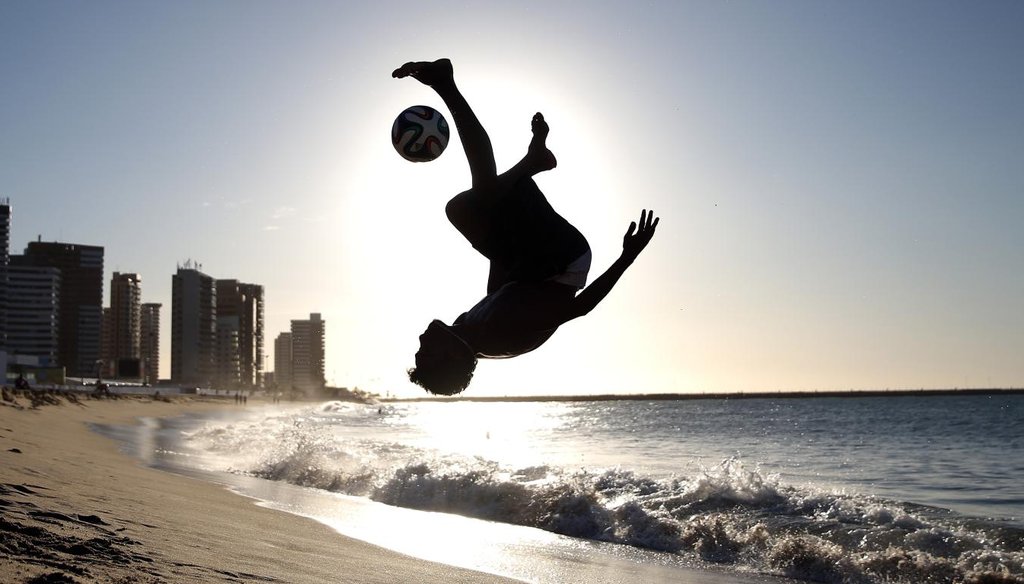Stand up for the facts!
Our only agenda is to publish the truth so you can be an informed participant in democracy.
We need your help.
I would like to contribute

A boy plays soccer on Iracema Beach in Fortaleza, Brazil, on the eve of the 2014 FIFA World Cup. Getty photo.
After seven years of preparation and billions spent on new stadiums and infrastructure, the wait is over: The 2014 FIFA World Cup is on in Brazil.
The month-long international soccer tournament is a mega event with teams from 32 countries squaring off in matches played in 12 venues around Brazil, which is bigger than the contiguous United States.
The World Cup comes every four years, drawing intense interest. Still, there are downsides for even the most dedicated soccer fans, and comedian John Oliver sought to highlight them in an epic rant against soccer’s governing body, known as FIFA, in his June 8 show.
The Last Week Tonight host targeted Brazil’s massive spending, the focus of protest for some Brazilians, and cast FIFA as a heavy-handed organization that interferes with host country laws to please sponsors.
We fact-checked two claims and found Oliver’s team did its research.
The ‘bird toilet’
One project that epitomizes World Cup waste more than any other, Oliver argued, is a new 42,000-seat stadium in a riverside city within the Amazon rainforest. It cost more than $300 million and sits on the site of an older, smaller stadium.
The host city of Manaus is so far off the beaten path, and so hard to access by road, that stadium materials were shipped by boat from Portugal and up through the Amazon River.
"Okay, that does seem like a waste of money, especially when you consider that that stadium is only going to be used for four World Cup games," Oliver said. "There’s also no team in Manaus that can fill it afterwards, at which point it becomes the world’s most expensive bird toilet."
Really? Just four games?
Really. A local team will use the stadium, but there’s no chance of it routinely filling up with the crowds that will come for the four World Cup matches. The U.S. team plays Portugal in the Arena Amazonia on June 22, by the way. We rate this claim True.
The ‘Budweiser bill’
Brazil had to do a lot of changing in order to handle the crowds arriving for the World Cup, spending billions to improve roads, airports and arenas.
The country also had to do away with a prohibition on booze at soccer matches to appease FIFA requirements, Oliver claimed.
"The amazing thing is here FIFA won. They successfully pressured Brazil into passing a so-called Budweiser bill, allowing beer sales in soccer stadiums," Oliver said. "And at this point you can either be horrified by that or relieved that FIFA was not also sponsored by cocaine and chainsaws."
As deaths from violence at soccer matches mounted, the Brazilian government passed a law in 2003 that banned alcohol sales at stadiums. But FIFA is sponsored by Budweiser and interested in profits from beer sales, so the prohibition had to go (but only for the World Cup).
President Dilma Rousseff signed a World Cup-related bill into law in June 2012. The bill that passed actually did not explicitly authorize beer sales at the matches, but government leaders said it allowed Brazil to lift the alcohol ban during the World Cup month, per FIFA’s demand.
On tap is Budweiser and Brahma -- in plastic cups. We rate this claim True.
Our Sources
See fact-checks.












































